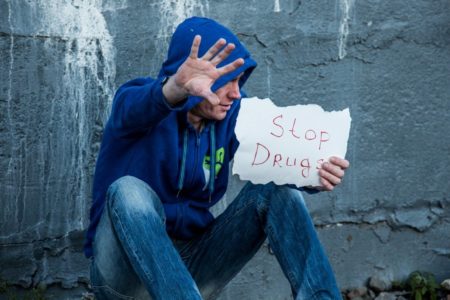Get a free mental health assessment and find out what treatment options are most suitable for you. We Level Up Florida can help with inpatient primary mental health therapy. Depending on the extent of secondary behavioral disorders such as addiction we can first help assess your condition and thereafter guide you to suitable treatment options.
Meth (Methamphetamine) is a highly addictive stimulant that affects the brain and can cause considerable health problems that can sometimes result in death. It can be smoked, snorted, injected, or taken orally and is often used with other substances. Meth can cause addiction in as little as one use in some users. This is mainly due to the rush of dopamine produced by the drug. Dopamine is a chemical that’s not only responsible for inducing feelings of pleasure. Meth addiction can be hard to beat. However, meth addiction treatment programs can help users break their physical and psychological dependence on the drug.
Meth is commonly taken in a binge pattern. What is clear, though, is that any use of meth has the ability to cause a range of harmful physical and psychological effects that may result in full-blown addiction.
Symptoms of Meth Addiction
Meth has been classified by the U.S. Drug Enforcement Administration as a Schedule II stimulant, which makes it legally available only through prescription. Symptoms of meth addiction may include:
- Not caring about personal appearance or grooming.
- Obsessively picking at hair or skin.
- Loss of appetite and weight loss.
- Dilated pupils and rapid eye movement.
- Strange sleeping patterns – staying up for days or even weeks at a time.
- Jerky, erratic movements; twitching; facial tics; animated or exaggerated mannerisms; and constant talking.
- Borrowing money often, selling possessions, or stealing.
- Angry outbursts or mood swings.
- Psychotic behavior, such as paranoia and hallucinations.
Short-Term Effects of Meth Addiction
Even taking small amounts of meth can cause harmful health effects, including:
- Increased attention and decreased fatigue
- Increased activity and wakefulness
- Decreased appetite
- Euphoria and rush
- Increased respiration
- Rapid and irregular heartbeat
- Hyperthermia – the condition of having a body temperature greatly above normal

Long-Term Effects of Meth Addiction:
Chronic meth use can lead to many damaging effects, even when people stop taking meth. This includes:

- Permanent damage to the heart and brain.
- High blood pressure leading to heart attacks, strokes, and death.
- Liver, kidney, and lung damage.
- Anxiety, confusion, and insomnia.
- Paranoia, hallucinations, mood disturbances, delusions, or violent behavior (psychotic symptoms can sometimes last for months or years after meth use)
- Intense itching, causing skin sores from scratching.
- Premature osteoporosis.
- Mood disturbances.
- Severe dental problems.
- Weight loss.
Meth Overdose
Meth addiction is a serious worldwide public health problem with major medical, psychiatric, socioeconomic, and legal consequences. [1] US National Library of Medicine National Institute of Health. According to data from the 2017 National Survey on Drug Use and Health (NSDUH), over 14.7 million people (5.4 percent of the population) have tried methamphetamine at least once [2] National Institute on Drug Abuse.
Meth is one of the world’s most addictive and dangerous substances. Acute overdose of crystal meth can be fatal.
Someone overdosing on meth may show the following signs and symptoms:
- Difficulty breathing
- Dangerously high body temperature
- Extreme agitation
- Seizures
- Severe stomach pain
- Heart attack
- Coma

Withdrawal Symptoms
Meth withdrawal symptoms are primarily psychological and emotional. Also, it may include several associated physical symptoms. Usually, when a person stops using crystal meth they will experience a “crash” which typically lasts 1 to 2 days, and then a longer period of withdrawal that may persist between 5 days and 3 weeks.
The most common withdrawal symptoms for meth addiction can be extremely intense. It’s recommended that people going through withdrawal do so under professional supervision at a trusted meth addiction treatment center.
Someone withdrawing from crystal meth may present with the following signs and symptoms:
- Anxiety
- Fatigue and Sleepiness
- Depression
- Psychosis
- Meth Cravings
- Increased Appetite
- Dry mouth
- Headaches
- Muscle spasms
- Low energy level
- Not feeling motivated
Combining Meth with Other Drugs
Meth and Alcohol
Meth is very dangerous on its own, and when combined with alcohol it can be even more deadly. The dangers of crystal meth and alcohol intensify if a person is addicted to both substances. People may use alcohol as a way to intensify the pleasurable symptoms of crystal meth use. Since crystal meth is a stimulant and alcohol is a depressant, they are sometimes used to blunt the extremes of the other.
Meth and Xanax
Xanax is a short-acting tranquilizer. It is most commonly used in the management of anxiety disorders. Taking meth with Xanax can be extremely dangerous. It can cause extreme sleepiness, heart attack, difficulty breathing, stroke, and unusual dizziness. It can also result in overdose and possible death.
Meth and Heroin
This is commonly known as speedballing. Combining a sedative (heroin) and a stimulant (meth) produces a more potent effect than either drug alone.
Meth Addiction Treatment
The best meth treatment options depend on the individual. There is no quick and easy cure for meth addiction, but meth addiction can be treated with physical and psychological methods.
Chronic meth addiction is also associated with cognitive problems, such as impaired decision-making and impaired behavioral inhibition. The most effective treatment for meth addiction at this point is psychotherapy.
Medically Supervised Detox
Detoxification is the part of meth addiction recovery where the body is given a chance to expel and process the drug from its system. Going to a medical detox center for professional assistance can lessen the severity of the withdrawal and detox timeline. Also, it is the safest and the most comfortable way to overcome an addiction. Seek help and a residential treatment center to receive the right support in your own way to recovery.
Psychotherapies
Behavioral therapies like cognitive behavioral therapy (CBT) may help modify the patient’s expectations and behaviors related to drug use and increase skills in coping with various life stressors.
Medications
There are currently no medications that counteract the specific effects of meth addiction. Drugs targeting withdrawal symptoms could help with getting through detox and maintaining long-term sobriety. Treating meth withdrawal symptoms might include medications like:
- Modafinil: A narcolepsy drug that helps regulate sleep It helps in alleviating the cognitive effects of meth use, such as memory loss and difficulty processing ideas
- Bupropion: An antidepressant that has also helped people quit smoking. It could help with meth withdrawal by regulating dopamine.
- Fluoxetine: Most commonly known as Prozac. It is an antidepressant that is also prescribed for anxiety. It helps in relieving depressive symptoms.
Inpatient medical detox and residential primary addiction treatment may be available at our affiliated facility at Level Up West Palm Beach Rehab. For some primary behavioral health treatment clients, medical detox and or addiction rehab may be required first. If you have a co-occurring severe substance abuse diagnosis, please contact us prior to beginning inpatient mental health therapy. Treatment services may vary. Please call us to learn which treatment options are most suited for your individual needs.
Sources:
[1] US National Library of Medicine National Institute of Health – https://www.ncbi.nlm.nih.gov/pmc/articles/PMC2883750/
[2] National Institute on Drug Abuse – https://www.drugabuse.gov/publications/research-reports/methamphetamine/overview